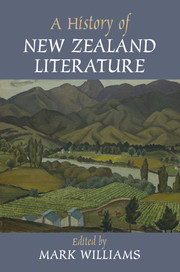Book contents
- Frontmatter
- Contents
- Notes on Contributors
- Acknowledgments
- Introduction
- PART I 1760–1920
- PART II 1920–1950
- PART III 1950–1972
- PART IV 1972–1990
- PART V 1990–2014
- 20 ‘While History Happens Elsewhere’: Fiction and Political Quietism, 1990–2014
- 21 Anecdote in Post-1990 New Zealand Poetry
- 22 From Exploring Identity to Facing the World: Drama Since 1990
- 23 From Meadow to Paddock: Children's and Young Adult Literature
- 24 ‘Nafanua and the New World’: Pasifika's Writing of Niu Zealand
- 25 New Zealand Literature in the Program Era, or, the Spirit of Nationalism Past
- Index
25 - New Zealand Literature in the Program Era, or, the Spirit of Nationalism Past
from PART V - 1990–2014
Published online by Cambridge University Press: 05 April 2016
- Frontmatter
- Contents
- Notes on Contributors
- Acknowledgments
- Introduction
- PART I 1760–1920
- PART II 1920–1950
- PART III 1950–1972
- PART IV 1972–1990
- PART V 1990–2014
- 20 ‘While History Happens Elsewhere’: Fiction and Political Quietism, 1990–2014
- 21 Anecdote in Post-1990 New Zealand Poetry
- 22 From Exploring Identity to Facing the World: Drama Since 1990
- 23 From Meadow to Paddock: Children's and Young Adult Literature
- 24 ‘Nafanua and the New World’: Pasifika's Writing of Niu Zealand
- 25 New Zealand Literature in the Program Era, or, the Spirit of Nationalism Past
- Index
Summary
To forget self and all, forget foremost
This whimpering second unlicked self my country,
…
Why that'd be freedom heydey, hey
For freedom that'd be the day
And as good a dream as any to be damned for.
Allen Curnow, ‘To Forget Self and All’Marx famously declared that all events in history occur twice, ‘the first time as tragedy, the second as farce’. He failed to mention that sometimes they were farce the first time. It is hard for the New Zealand literary critic to avoid a feeling of déjà vu in approaching the controversy generated by Patrick Evans's article ‘Spectacular Babies: The Globalisation of New Zealand Fiction’, published in Kite in 2002, a controversy that only truly found its footing when a truncated version of the paper was republished in the New Zealand Listener as ‘The Baby Factory’ in August 2003.
In what must have seemed a strange turn of events for Evans, who has long been an uncompromising – even vituperative – critic of New Zealand's mid-century nationalists, he found himself the centre of a sudden revival of cultural anxiety about ‘the removal or neutralising of the New Zealand referent from fiction written by New Zealanders’. Worse, he found himself cast as purity policeman, inspecting New Zealand's novels for sufficient local identity: praising Damien Wilkins for allowing Wellington's ‘distinctive verticality, its physical shaping of the protagonist's personal history’ to ‘dominate’ his novel The Miserables, while scolding Elizabeth Knox for trying to become an ‘international writer’ in The Vintner's Luck and Black Oxen, works that, in Evans's view, have set a lamentably influential example of ‘the removal or neutralising of the New Zealand referent from fiction written by New Zealanders’.
This demand that New Zealand literature must be ‘a real expression of what the New Zealander is and a part of what he may become’ (not Evans, that's Allen Curnow in his introduction to A Book of New Zealand Verse: 1923–45, the ur-text of New Zealand cultural nationalism) is occasioned for Evans by what he sees as a new spectre haunting New Zealand writing: Bill Manhire's creative writing programme at Victoria University of Wellington (VUW).
- Type
- Chapter
- Information
- A History of New Zealand Literature , pp. 374 - 388Publisher: Cambridge University PressPrint publication year: 2016



